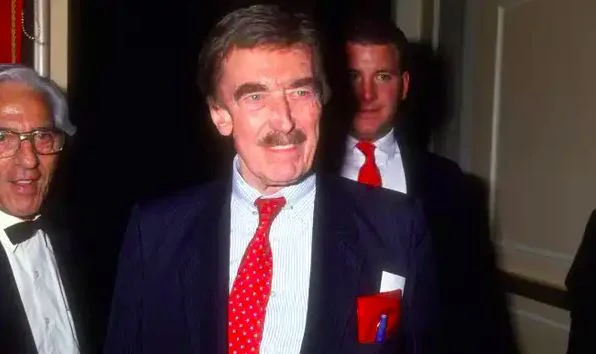
Fred Trump Net Worth and Bio of Real Estate Mogul
Fred Trump, born on October 11, 1905, in the borough of Queens, New York City, was a prominent real estate developer whose legacy is intertwined with the rise of his son, Donald Trump, the 45th President of the United States. Fred Trump built a real estate empire that laid the foundation for his family’s fortune, and his influence in the world of urban development was significant. Known for his business acumen and aggressive construction strategies, Fred Trump became a figure of both admiration and controversy. This article explores his life, career, and legacy, alongside an assessment of his net worth during his lifetime.
Fred Trump Net Worth
| Category | Richest People |
|---|---|
| Net Worth | $250 million and $300 Million |
| Birthdate | October 11, 1905 |
| Birthplace | Queens, New York City, United States |
| Profession | Real Estate Developer and Builder. |
| Height | 6’6″ / 185cm |
| Weight | 176lbs / 80kg |
Fred Trump’s net worth at the time of his death in 1999 was estimated to be between $250 million and $300 million. This fortune primarily stemmed from his decades-long career in real estate development. Fred Trump’s strategic investments in affordable housing projects, as well as his ability to navigate government subsidies, allowed him to build a significant portfolio of properties across New York City. His wealth was accumulated not through one-off projects, but by repeatedly investing in and developing residential complexes that generated consistent revenue over the years.
Fred Trump Real Estate Holdings
Fred Trump’s real estate holdings were vast and included both low-income housing units and luxury apartments. His portfolio spanned several boroughs in New York, with a focus on Queens, Brooklyn, and Staten Island. Notable developments included large apartment buildings such as the Beach Haven Apartments and numerous housing complexes under federal government programs, including the Federal Housing Administration (FHA), which helped subsidize much of his work. These properties generated substantial rental income, contributing to his wealth.
Fred was also known for using creative financing methods, including tax avoidance strategies and leveraging government programs to minimize expenses. His ability to secure favorable loan terms and to negotiate with city officials was critical to his ability to grow his real estate portfolio. The longevity of his investments and the strategic nature of his developments provided Fred Trump with steady income streams throughout his career.
Fred Trump Influence of Donald Trump on the Family Fortune
While Fred Trump amassed a considerable fortune, it was his son, Donald Trump, who would ultimately elevate the family business to global prominence. Donald inherited his father’s business acumen and used his inherited wealth as a stepping stone to grow the Trump Organization into a multinational conglomerate. Under Donald’s leadership, the company expanded into high-profile ventures, including luxury hotels, casinos, golf resorts, and, later, media and entertainment ventures like The Apprentice.
Donald’s ability to market the Trump name and brand played a major role in propelling the family business from a local operation to an internationally recognized name. This transformation, however, also saw controversial moments and business risks that Fred had generally avoided. Nonetheless, the core real estate principles Fred established laid the groundwork for his son’s success, and his father’s legacy as a builder continued to influence Donald’s approach to real estate development.
Fred Trump The Trump Organization’s Growth and Global Reach
As the Trump Organization expanded under Donald Trump’s leadership, Fred’s initial influence as a real estate developer remained prominent. The company grew through a combination of strategic property acquisitions, branding, and high-profile real estate projects. Donald Trump’s ventures, including the Trump Tower in New York, the Trump International Hotel in Washington, D.C., and other high-end developments, were a direct reflection of the foundational business practices Fred Trump had established.
The Trump brand became synonymous with luxury, wealth, and success in the real estate industry. However, Fred Trump’s method of conservative growth and local focus evolved under his son’s more aggressive and high-profile global strategy, which dramatically expanded the family’s presence in international markets.
Fred Trump The Legacy of Fred Trump’s Financial Wisdom
Fred Trump’s financial legacy is not only measured by the properties he developed but by the business philosophies he instilled in his children, especially Donald. His emphasis on efficient construction, managing risk, and leveraging political relationships within New York City’s political landscape shaped the next generation of Trump real estate operations. Donald Trump’s strategy to expand the family name into other industries, like media and entertainment, helped maintain the family’s financial status even as the real estate market fluctuated.
Fred’s management techniques and investments served as a foundation for the Trump Organization’s eventual transition from a real estate company to a diversified conglomerate. Fred Trump’s financial strategies, particularly his ability to leverage debt and minimize taxes through creative accounting, also influenced how his son approached financial management, both in real estate and in other sectors.
Fred Trump Early Life and Education
Trump was born on October 11, 1905, in Queens, New York, to German immigrants, Elizabeth Christ and Frederick Trump. His parents had moved to the United States in search of better opportunities, and Fred’s father, Frederick Trump, was a successful restaurateur who later transitioned into real estate. Growing up in a modest household, Fred witnessed firsthand the challenges and hard work required to make a living, which left a lasting impact on his outlook on life and business. The principles of hard work, resilience, and ambition were instilled in him from an early age, largely due to his father’s influence.
Fred Trump Education and Early Schooling
Fred Trump attended local public schools in Queens, where he received a basic education. Though there is little known about his academic achievements, it is clear that Fred was more focused on learning practical skills rather than excelling in traditional classroom subjects. His family did not have wealth or connections to secure him a spot in elite schools, but Fred’s ambition drove him to focus on his future prospects outside of the classroom.
At the age of 16, Fred Trump briefly attended Richmond Hill High School but left before graduation in order to help support his family. This decision was influenced by the financial difficulties caused by the Great Depression, which had a profound effect on the nation’s economy. The timing of his departure from school proved pivotal in shaping Fred’s future, as it prompted him to seek out practical work experience rather than continue his formal education.
Fred Trump Influence of Family Business
Fred’s father, Frederick Trump, played a crucial role in shaping his early career. While Fred was growing up, his father had ventured into real estate, focusing on building homes and managing properties in the New York City area. Fred’s first exposure to the real estate business came at an early age, as he worked alongside his father in his various enterprises.
The hands-on experience he gained from helping his father with construction projects, property management, and business dealings helped to build Fred’s foundation in real estate. The lessons he learned during these years were more valuable than any formal education could have provided, giving him the practical knowledge needed to navigate the complexities of the real estate market. His early experiences instilled in him an understanding of construction, financial management, and dealing with clients and contractors—all of which would serve him well as he ventured out on his own.
Fred Trump Lack of Formal Higher Education
Fred Trump’s decision to leave school at a young age meant that he did not pursue a formal college education. Unlike many of his peers in the business world, Fred did not attend university or obtain a degree in business or real estate. However, this did not hinder his ability to succeed. His education came in the form of real-world experience and the mentorship he received from his father. The lessons he learned working in construction and real estate were key to his later accomplishments and helped him build his own successful empire.
While some may have seen his lack of higher education as a disadvantage, Fred Trump leveraged his practical knowledge and understanding of the industry to excel in his business ventures. The hands-on approach he adopted in his career would become a hallmark of his real estate development strategies, focusing on efficiency and profitability over formal academic credentials.
Fred Trump Rise to Success in Real Estate
Fred Trump’s real estate journey began in the mid-1920s when he started working on small construction projects in Queens, New York. With a sharp eye for opportunity, he began building single-family homes in working-class neighborhoods. His big break came during the 1930s and 1940s, when he capitalized on government programs aimed at providing affordable housing during the Great Depression. By securing government subsidies, Fred Trump was able to construct large apartment complexes for low-income families, a move that allowed him to mitigate the financial risks that other smaller developers faced. These early successes in affordable housing laid the foundation for his growing influence in the real estate market.
By the 1950s, Fred Trump had built an expansive real estate portfolio that spanned much of New York City. His properties ranged from modest single-family homes to larger apartment buildings. He became known for his ability to build large-scale projects that catered to the city’s rapidly growing working-class population. Trump’s ability to navigate the complex bureaucratic and regulatory landscape, as well as his strategic use of relationships with city officials and contractors, played a pivotal role in his success. By the end of the 1950s, he had solidified his reputation as one of New York’s most successful developers, with hundreds of buildings to his name.
Fred Trump Family and Personal Life
Fred Trump married Mary MacLeod, a Scottish immigrant, in 1936. Together, they had five children, with their eldest son, Donald Trump, later rising to fame as a business mogul and eventually the 45th President of the United States. Fred was a strict father, instilling in his children the values of hard work, discipline, and business acumen. While he was known for being a somewhat distant and private individual, his influence on Donald’s entrepreneurial spirit was undeniable. The lessons Fred imparted about business and perseverance were integral to shaping Donald’s later success in real estate and politics.
Despite his wealth and accomplishments, Fred Trump led a rather modest lifestyle. He and his family lived in the same home in Queens for most of his life, reflecting his practical and no-frills approach to life. His personal life remained largely private, and he was not known for flaunting his riches. Fred’s focus was primarily on his business dealings, which centered on efficiency, cost-cutting, and leveraging his extensive connections within the New York City real estate world. His commitment to building a lasting family legacy through his business was reflected in his decision to pass down his empire to his children, especially Donald, whom he considered his successor.
Fred Trump Controversies and Legal Issues
Despite his success, Fred Trump’s career was not without its controversies. One of the most significant legal challenges he faced occurred in the 1970s when the U.S. Department of Justice filed a lawsuit against the Trump Organization for discriminatory practices in housing. The suit alleged that Fred Trump’s real estate company had refused to rent apartments to African American tenants, a practice that violated the Fair Housing Act. The case was eventually settled without any admission of wrongdoing, but it cast a long-lasting shadow over his reputation. The incident was part of a broader pattern of racial discrimination in the housing market during that time, and it raised questions about Fred Trump’s business practices and ethics.
In addition to the housing discrimination case, Fred Trump’s financial practices came under scrutiny. He was investigated for alleged tax fraud and other irregularities in his business dealings. Critics argued that he used various legal loopholes and creative accounting methods to minimize his tax liabilities, a strategy that his son Donald Trump would later adopt in his own business. Although no significant legal action was taken against Fred Trump during his lifetime, these issues have remained a point of contention in discussions about his legacy. Despite these controversies, Fred Trump’s success in real estate and his ability to navigate complex legal and business environments were undeniable, and his empire continued to grow throughout his career.
Conclusion
Fred Trump’s life was defined by a relentless drive to succeed in the competitive world of real estate. His determination to build wealth and establish a lasting legacy shaped not only his career but also the future of his family. Despite his lack of formal education, Trump capitalized on his practical knowledge and the early lessons he learned from his father’s real estate ventures. His aggressive approach to construction, coupled with his ability to navigate the complex world of government regulations and urban development, allowed him to accumulate significant wealth. Throughout his career, he built thousands of affordable housing units and shaped the urban landscape of New York City. Though his methods were sometimes controversial, Fred Trump’s legacy in real estate remains a testament to his skill in leveraging opportunities and overcoming challenges.
Fred Trump’s influence extended far beyond his own success. His wealth and expertise served as the foundation for the future accomplishments of his son, Donald Trump, who would eventually build upon Fred’s real estate empire and gain international fame. Fred’s story demonstrates the power of hard work, strategic connections, and a firm belief in one’s instincts. His career shows that, while controversy may follow those who seek to challenge the status quo, determination and a clear vision for the future can lead to lasting success and generational impact.



